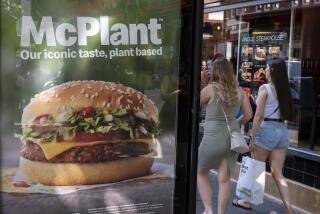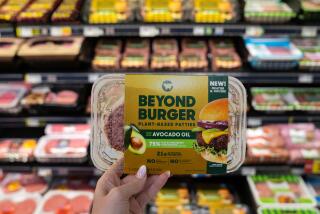Scientists working on $330,000 test-tube-meat burger
- Share via
Would you eat mystery meat grown in a lab if doing so was better for the environment? The debate may seem abstract, but scientists could turn a test-tube burger into reality by October.
The $330,000 project being conducted by Mark Post, chairman of physiology at Maastricht University in the Netherlands, involves a cow’s stem cells and funds from an anonymous private investor.
Post has already created several small strips of muscle tissue that, once he makes thousands more, will be mashed together to create a burger patty. The first sandwich could be ready this fall, he said during a presentation at the annual meeting of the American Assn. for the Advancement of Science in Vancouver, Canada.
Though companies such as Tyson Foods and JBS have asked about possible meat substitutes, much of the $74-billion beef industry is still in wait-and-see mode, according to the science group.
But coming up with alternatives is a pressing concern, according to researchers who claim that conventional livestock production is devastating to the environment and dangerous for human health.
“Animal farming is by far the biggest ongoing environmental catastrophe,” said Patrick Brown, a biochemist at Stanford University School of Medicine. Brown is working on a separate project aimed at creating meat substitutes -- and eventually dairy and other products -- using plant materials.
Supermarket shelves have seen growing a growing number of mock meats -- known as meat analogues -- as the ranks of vegetarians and vegans grow. Manufacturers often use tofu, tempeh and other soy products as a base. PETA is offering a $1-million prize to the first producer who manages to sell in-vitro chicken meat in 10 states by the end of June.
Demand for meat worldwide will boom 60% by 2050, according to Nicholas Genovese, who organized the Vancouver conference. Factory farms take up massive swaths of land and suck up enormous energy reserves while crowding together animals who, in those closely confined quarters, could spawn outbreaks of E.coli and other food-borne illnesses, he said.
Building meat using science, Post said, would require 40% less energy than the usual meat production cycle. But that hasn’t gotten Michelin-starred chef Heston Blumenthal on board -- contrary to published reports, a spokeswoman said Blumenthal has no plans to cook Post’s patty once it’s ready.
RELATED:
Spork Foods wishes you a very vegan Thanksgiving
Restaurants are super-sizing their nutritional disclosures
More to Read
Inside the business of entertainment
The Wide Shot brings you news, analysis and insights on everything from streaming wars to production — and what it all means for the future.
You may occasionally receive promotional content from the Los Angeles Times.











